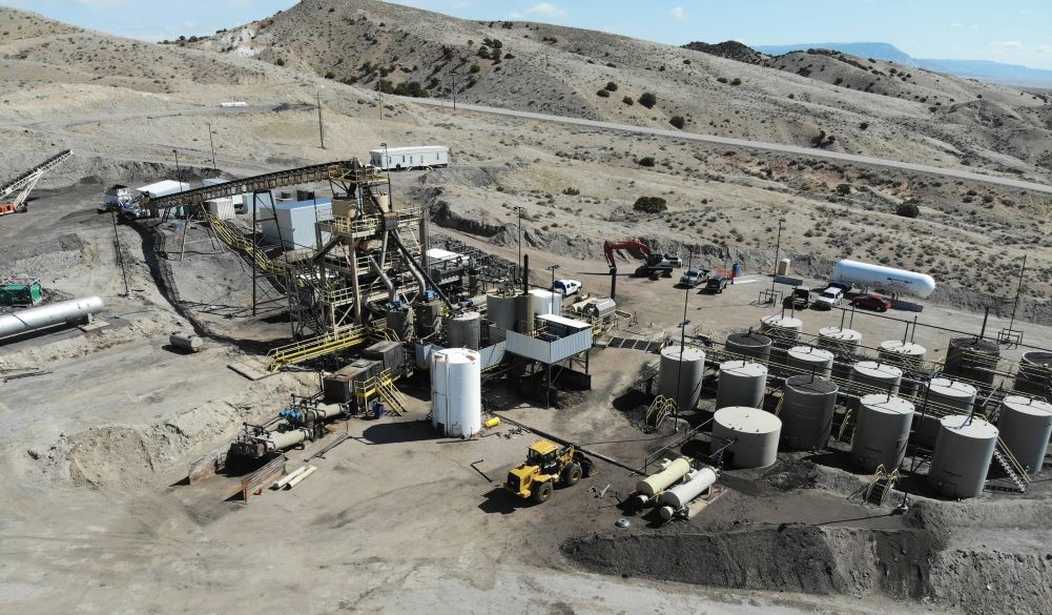Poised in the remote, arid plains of Utah, steam billows into the clear blue sky, and an American flag flies high above the complex operation of extracting, and churning clean sand, and oil.
Only this is no ordinary mining operation. Instead, it’s one of the groundbreaking Petroteq “green” extraction enterprises, which some analysts are lauding as a potential ceasefire solution amid the war between traditional right-titled oil advocates and the Biden administration’s left-leaning environmental policies.
According to President of Petroteq Energy, Jerry Bailey, it just may strike a necessary and realistic balance between staunch petroleum proponents and the climate-concerned.
“Oil isn’t going anywhere. But all these niche markets – solar, wind, hydro-electric geothermal. All those things can also contribute to a better world. But they aren’t going to replace oil,” he said. “We have enough oil in the ground – fifty years or so in the United States. We have new technology, but even so, the current administration is doing everything they can to stop any production of an oil pipeline.”
Hydraulic fracturing – better known as fracking – has paved the way for a gas boom in the U.S., enabling companies to reach wells once deemed impossible. Nonetheless, it typically requires a great deal of wastewater, discharges methane gas, and runs the risk of contaminating water supplies.
Through proprietary technology, Petroteq is “able to produce oil without water, waste tailings ponds and emissions,” Bailey noted. The company uses a unique oil sands extraction method known as Clean Oil Recovery Technology (CORT) which refines bitumen into crude oil. According to Petroteq’s assessments, the patented mechanism can also extract up to ninety-nine percent of hydrocarbons, which “allows maximum bitumen extraction while leaving zero waste.”
As it stands, the system produces around 500 barrels a day, with the productivity goal set to reach 5000 barrels by 2022. Already operating in the U.S, Bailey said they are filing for CORT patents in more than thirty other countries identified as having prominent oil sands basins, thus setting the groundwork for a more environmentally friendly industry overhaul.
In addition to Petroteq, several other companies are investing heavily in greener fracking. For one, Shell has poured billions since 2016 into its “New Energies” division focused on decarbonizing. Other companies in recent years have turned to the CleanWave system, which utilizes positively charged ions and bubbles to expel pollutants or to membrane distillation. This desalination method facilitates drilling operations to repurpose the water without initially diluting it with fresh water.
Yet even with the technology breakthroughs, it is a steep hill to climb given the administration’s oil-adverse stance.
“The current administration is causing a definite negative effect on the oil and gas industry. They are trying to stop all the practices necessary to contribute to the production,” Bailey lamented.
President Biden’s categorical policy objective is to dwindle U.S. oil and gas manufacturing, which includes limiting drilling rights and halting leases on federal land, thus reducing the world’s inventory of fossil fuels under the guise of tackling climate change.
But the cracks are already evident. In recent weeks, Biden’s team has implored the Organization of Petroleum Countries (OPEC) oil consortium to increase activity at the pump so that the oil prices don’t continue to rise due to his policies. But, so far, OPEC and its partners have failed to reach such an agreement, sending the oil price soaring to a six-year high last Tuesday.
And with the demand not able to meet the supply as COVID-19 restrictions ease and travel resumes, it’s the average – and most impoverished – Americans who are and will continue to be hit the hardest.
“It starts having all kinds of ripple effects; filling a gas tank for sixty dollars is big money for families. It impacts their transportation, their food, their housing,” Bailey continued. “It’s those in the upper-income brackets who don’t see the impact of this as bad because it is not as big a portion of their income.”
The White House has endeavored to pause new leases for extraction on federal land and append leases across pockets of Alaska, which Bailey views as an especially fatal mistake for the U.S. given the state’s potential for exploration.
However, soaring prices at the pump also threaten to blunt a significant sector of the Democrat voting base. Skyrocketing energy prices – including natural gas and propane prices – ricochet into increasing the cost of consumer goods across the board.
Oil industry advocates also caution that Biden’s protocols harm already financially hamstrung Americans and pose a threat to U.S. energy dependence and national security – rendering the homeland more reliant on volatile regions like the Middle East to keep the country fueled.
According to Ken Mahoney, CEO of the Wall Street-based firm Mahoney Asset Management, Biden’s policies render the U.S. more dependent on foreign oil and the Middle East.
“Renewable energy is still secondary. It is not tried and tested, so the risk of having distribution failures is high; just take a look at what happened in Texas as their grid went down for several days without anything being done,” he stressed. “There is a balance, but you can’t go head over heels into renewable energy. Millions of American jobs rely on fossil fuels, and as a result, so does our economy.”
And Dr. Brenda Shaffer, senior advisor for energy at the Foundation for Defense of Democracies (FDD), noted that there are also significant geopolitical implications of moving from an energy system based on oil and natural gas to one based on electricity from other sources.
“It means a move from an energy system where the USA is the largest producer to one where China is dominant through control of the relevant minerals. Greater use of electricity means greater cyber threats. The smarter the grids and the meters, the easier it is for malign actors to conduct cyberattacks,” Shaffer explained. “The restriction of oil and gas production in the West creates a commercial opportunity in the Middle East and other energy-producing regions.”
But whether or not Biden will embrace a happy medium is yet to be seen. Environmental defenders have already cautioned that moderate changes are not sufficient, with more than fifty groups demanding in a letter to the White House last month that the Commander-in-Chief “not only end the federal leasing programs but to wind down existing federal oil and gas production.”
The predicament, critics say, is that we are far from being a planet without fossil fuels and not likely to become one anytime soon.
So are the two sides going to remain at ardent ends of the spectrum, or can groups come together to configure a better balance?
“With this administration, the balance of Petroteq seems to be the best way we can move forward as the cost to the environment compared with the successful production of energy is an efficient and productive balance,” Mahoney added.














Join the conversation as a VIP Member